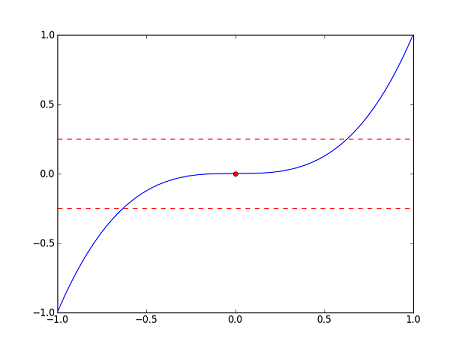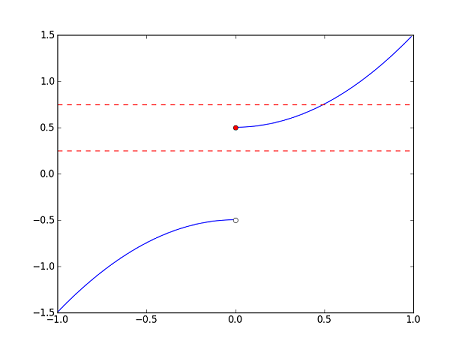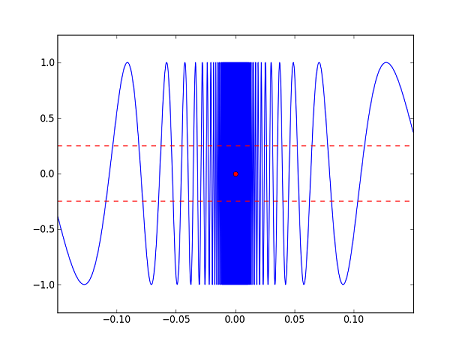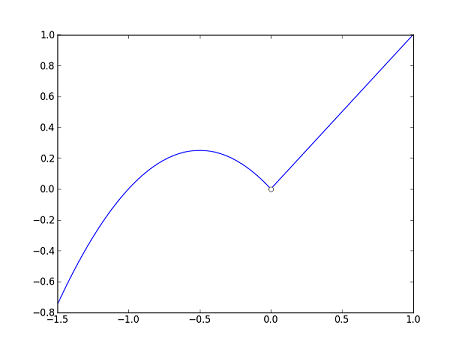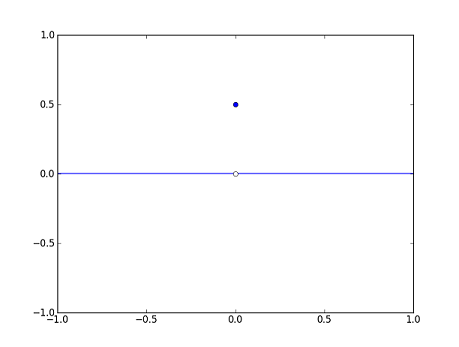Contents
[hide]Limit of a Function at a Point
by: Michael Yeh, proud Member of the Math Squad.
keyword: tutorial, limit, function, sequence
Introduction
Provided here is a brief introduction to the concept of "limit," which features prominently in calculus. We first discuss the limit of a function at a point; to help motivate the definition, we first consider continuity at a point. Unless otherwise mentioned, all functions here will have domain and range $ \mathbb{R} $, the real numbers. Words such as "all," "every," "each," "some," and "there is/are" are quite important here; read carefully!
Continuity at a point
Let's consider the the following three functions along with their graphs (in blue). The red dots in each correspond to $ x=0 $, e.g. for $ f_1 $, the red dot is the point $ (0,f_1(0))=(0,0) $. Ignore the red dashed lines for now; we will explain them later.
- $ \displaystyle f_1(x)=x^3 $
- $ f_2(x)=\begin{cases}-x^2-\frac{1}{2} &\text{if}~x<0\\ x^2+\frac{1}{2} &\text{if}~x\geq 0\end{cases} $
- $ f_3(x)=\begin{cases} \sin\left(\frac{1}{x}\right) &\text{if}~x\neq 0\\ 0 &\text{if}~x=0\end{cases} $
We can see from the graphs that $ f_1 $ is "continuous" at $ 0 $, and that $ f_2 $ and $ f_3 $ are "discontinuous" at 0. But, what exactly do we mean? Intuitively, $ f_1 $ seems to be continuous at $ 0 $ because $ f_1(x) $ is close to $ f_1(0) $ whenever $ x $ is close to $ 0 $. On the other hand, $ f_2 $ appears to be discontinuous at $ 0 $ because there are points $ x $ which are close to $ 0 $ but such that $ f_2(x) $ is far away from $ f_2(0) $. The same observation applies to $ f_3 $.
Let's make these observations more precise. First, we will try to estimate $ f_1(0) $ with error at most $ 0.25 $, say. In the graph of $ f_1 $, we have marked off a band of width $ 0.5 $ about $ f_1(0) $. So, any point in the band will provide a good approximation here. As a first try, we might think that if $ x $ is close enough to $ 0 $, then $ f_1(x) $ will be a good estimate of $ f_1(0) $. Indeed, we see from the graph that for any $ x $ in the interval $ (-\sqrt[3]{0.25},\sqrt[3]{0.25}) $, $ f_1(x) $ lies in the band (or if we wish to be more pedantic, we would say that $ (x,f_1(x)) $ lies in the band). So, "close enough to $ 0 $" here means in the interval $ (-\sqrt[3]{0.25},\sqrt[3]{0.25}) $; note that any point which is close enough to $ 0 $ provides a good approximation of $ f_1(0) $.
There is nothing special about our error bound $ 0.25 $. Choose a positive number $ \varepsilon $, and suppose we would like to estimate $ f_1(0) $ with error at most $ \varepsilon $. Then, as above, we can find some interval $ \displaystyle(-\delta,\delta) $ about $ 0 $ (if you like to be concrete, any $ \displaystyle\delta $ such that $ 0<\delta<\sqrt[3]{\varepsilon} $ will do) such that $ f_1(x) $ is a good estimate for $ f_1(0) $ for any $ x $ in $ \displaystyle(-\delta,\delta) $. In other words, for any $ x $ which is close enough to $ 0 $, $ f_1(x) $ will be no more than $ \varepsilon $ away from $ f_1(0) $.
Can we do the same for $ f_2 $? That is, if $ x $ is close enough to $ 0 $, then will $ f_2(x) $ be a good estimate of $ f_2(0) $? Well, we see from the graph that $ f_2(0.25) $ provides a good approximation to $ f_2(0) $. But if $ 0.25 $ is close enough to $ 0 $, then certainly $ -0.25 $ should be too; however, the graph shows that $ f_2(-0.25) $ is not a good estimate of $ f_2(0) $. In fact, for any $ x>0 $, $ f_2(-x) $ will never be a good approximation for $ f_2(0) $, even though $ x $ and $ -x $ are the same distance from $ 0 $.
In contrast to $ f_1 $, we see that for any interval $ \displaystyle(-\delta,\delta) $ about $ 0 $, we can find an $ x $ in $ \displaystyle(-\delta,\delta) $ such that $ f_2(x) $ is more than $ 0.25 $ away from $ f_2(0) $.
The same is true for $ f_3 $. Whenever we find an $ x $ such that $ f_3(x) $ lies in the band, we can always find a point $ y $ such that 1) $ y $ is just as close or closer to $ 0 $ and 2) $ f_3(y) $ lies outside the band. So, it is not true that if $ x $ is close enough to $ 0 $, then $ f_3(x) $ will be a good estimate for $ f_3(0) $.
Let's summarize what we have found. For $ f_1 $, we saw that for each $ \varepsilon>0 $, we can find an interval $ \displaystyle(-\delta,\delta) $ about $ 0 $ ($ \displaystyle\delta $ depends on $ \varepsilon $) so that for every $ x $ in $ \displaystyle(-\delta,\delta) $, $ |f_1(x)-f_1(0)|<\varepsilon $. However, $ f_2 $ does not satisfy this property. More specifically, there is an $ \varepsilon>0 $, namely $ \varepsilon=0.25 $, so that for any interval $ \displaystyle(-\delta,\delta) $ about $ 0 $, we can find an $ x $ in $ \displaystyle(-\delta,\delta) $ such that $ |f_2(x)-f_2(0)|\geq\varepsilon $. The same is true of $ f_3 $.
Now we state the formal definition of continuity at a point. Compare this carefully with the previous paragraph.
DEFINITION 1. Let $ f $ be a function from $ \displaystyle A $ to $ \mathbb{R} $, where $ A\subset\mathbb{R} $. Then $ f $ is continuous at a point $ c\in A $ if for every $ \varepsilon>0 $, there is a $ \displaystyle\delta>0 $ such that $ |f(x)-f(c)|<\varepsilon $ for any $ x $ that satisfies $ \displaystyle|x-c|<\delta $. $ f $ is said to be continuous if it is continuous at every point of $ A $.
In our language above, $ \varepsilon $ is the error bound, and $ \displaystyle\delta $ is our measure of "close enough (to $ c $)." Note that continuity is defined only for points in a function's domain. So, the function $ k(x)=1/x $ is technically continuous because $ 0 $ is not in the domain of $ k $. If, however, we defined $ k(0)=0 $, then $ k $ will no longer be continuous.
The Limit of a Function at a Point
Now, let's consider the two functions $ g_1 $ and $ g_2 $ below. Note that $ F $ is left undefined at $ 0 $.
- $ g_1(x)=\begin{cases}-x^2-x &\text{if}~x<0\\ x&\text{if}~x>0\end{cases} $
- $ g_2(x)=\begin{cases}0 &\text{if}~x\neq 0\\ \frac{1}{2}&\text{if}~x=0\end{cases} $
Recall the function $ f_1 $ from the previous section. We found that it was continuous at $ 0 $ because $ f_1(x) $ is close to $ f_1(0) $ if $ x $ is close enough to $ 0 $. We can do something similar with $ g_1 $ and $ g_2 $ here. From the graph, we can see that $ g_1(x) $ is close to $ 0 $ whenever $ x $ is close enough, but not equal to, $ 0 $. Similarly, we see that $ g_2(x) $ is close to $ 0 $ whenever $ x $ is close enough, but not equal to, $ 0 $. The "not equal" part is important for both $ g_1 $ and $ g_2 $ because $ g_1 $ is undefined at $ x=0 $ while $ g_2 $ has a discontinuity there. The idea here is similar to that of continuity, but we ignore whatever happens at $ x=0 $. We are concerned more with how $ g_1 $ and $ g_2 $ behave near $ 0 $ rather than at $ 0 $. This leads to the following definition.
DEFINITION 2. Let $ f $ be a function defined for all real numbers, with possibly one exception, and with range $ \mathbb{R} $. Let $ c $ be any real number. We say that the limit of $ f $ at $ c $ is $ b $, or that the limit of $ f(x) $ as $ x $ approaches $ c $ is $ b $, and write $ \lim_{x\to c}f(x)=b $ if for every $ \varepsilon>0 $, there is a $ \displaystyle\delta>0 $ such that $ |f(x)-b|<\varepsilon $ whenever $ \displaystyle 0<|x-c|<\delta $.
This is the same as the definition for continuity, except we ignore what happens at $ c $. We can see this in two places in the above definition. The first is the use of $ b $ instead of $ f(c) $, and the second is the condition $ \displaystyle 0<|x-c|<\delta $, which says that $ x $ is close enough, but not equal to, $ c $. The restriction on the domain of $ f $ in the above definition is not really necessary; if $ f $ has domain $ A\subset\mathbb{R} $, we can define $ \lim_{x\to c}f(x) $ for any $ c $ which is a "limit point" of $ \displaystyle A $. But, in calculus, one usually encounters the situation described in the definition.
If you've ever seen "Mean Girls," you know that the limit does not always exist. For example, if $ f_2 $ is the function in the previous section, then $ \lim_{x\to 0}f_2(x) $ does not exist. We will show this rigorously in the exercises, but it is clear from the graph of $ f_2 $.
Having defined what a limit is, we make a few remarks about how continuity and limit are related. As a first observation, we can now restate the definition of continuity at a point more succinctly in terms of limits: $ f $ is continuous at $ c $ if and only if $ \displaystyle\lim_{x\to c}f(x)=f(c) $. Now, let's take a look at the functions $ g_1 $ and $ g_2 $ defined earlier. $ g_1 $ is continuous at every point of its domain; however, it is undefined at $ 0 $. But since $ \lim_{x\to 0}g_1(x) $ exists and equals $ 0 $, we can make $ g_1 $ continuous on the entire real line by defining $ g_1(0)=0 $. We note that even though $ \lim_{x\to 0}g_2(x) $ exists, $ g_2 $ is discontinuous at $ 0 $; this is because $ \lim_{x\to 0}g_2(x)=0\neq \frac{1}{2}=g_2(0) $. This shows that the existence of $ \displaystyle\lim_{x\to c}f(x)=f(c) $ does not imply continuity at $ c $, even though, as we mentioned earlier, continuity of $ f $ at $ c $ implies the existence of $ \displaystyle\lim_{x\to c}f(x)=f(c) $.
Limits at Infinity
Let $ f $ be as in Definition 2. So far, we have only discussed $ \displaystyle\lim_{x\to c}f(x)=f(c) $ when $ c $ is a real number. It is not difficult to modify Definition 2 for when $ c=\pm\infty $. In Definition 2, we considered $ x $ to be "close enough" when $ x $ is in the interval $ \displaystyle(c-\delta,c+\delta) $ and $ x\neq c $. For $ \infty $, the analogue would be that $ x $ belongs to an interval of the form $ \displaystyle(M,\infty) $, where $ M $ is a real number, and similarly for $ -\infty $. So, let $ f $ be a function with domain and range $ \mathbb{R} $. We say that the limit of $ f $ at $ \infty $ (respectively, $ -\infty $) is $ b $ and write $ \displaystyle\lim_{x\to\infty}f(x)=b $ (respectively, $ \displaystyle\lim_{x\to-\infty}f(x)=b $) if for every $ \varepsilon>0 $, there is a real number $ M $ so that $ |f(x)-b|<\varepsilon $ whenever $ x>M $ (respectively, $ x<M $).
Exercises
A) Show that any constant function is continuous.
B) Suppose $ \lim_{x\to c}f(x)=a $ and $ \lim_{x\to c}g(x)=b $. Show that $ \lim_{x\to c}(f+g)(x)=a+b $, $ \lim_{x\to c}(f-g)(x)=a-b $, and $ \lim_{x\to c}(fg)(x)=ab $ are continuous. Furthermore, if $ g(c)\neq0 $, show that $ \lim_{x\to c}(\frac{f}{g})(x)=\frac{a}{b} $.
C) Show that $ \lim_{x\to 0}f_2(x) $ does not exist.
D) Compute the following limits (if they exist):
- i)$ \lim_{x\to0}7 $
- ii)$ \lim_{x\to2}5x^2-3 $
- iii)$ \lim_{x\to\infty}\frac{2x^4-3x^2-1}{x^3+5} $
- iv)$ \lim_{x\to2}\frac{x^3-10x^2+4}{4x^3-2} $
- v)$ \lim_{x\to\infty}\frac{5x^2-3}{x+2} $
E) (Derivatives) Let $ f $ is a function from $ \mathbb{R} $ to $ \mathbb{R} $ and $ c\in\mathbb{R} $. If $ \lim_{h\to 0}\frac{f(c+h)-f(c)}{h} $ exists, we say that $ f $ is differentiable at $ c $. The above limit is then called the "derivative of $ f $ at $ c $" and is denoted by $ f'(c) $. Intuitively, $ f'(c) $ is the instantaneous rate of change of $ f $ at the point $ c $; it is also the slope of the line tangent to the graph of $ f $ at the point $ (c,f(c)) $.
- i) Let $ f(x)=x^2 $. Show that $ f $ is differentiable everywhere, and compute $ f' $.
- ii) Let $ g(x)=|x| $. Show that $ g $ is not differentiable at $ 0 $.
Questions and comments
If you have any questions, comments, etc. please, please please post them below:
- Comment / question 1
- Comment / question 2
The Spring 2014 Math Squad was supported by an anonymous gift to Project Rhea. If you enjoyed reading these tutorials, please help Rhea "help students learn" with a donation to this project. Your contribution is greatly appreciated.

